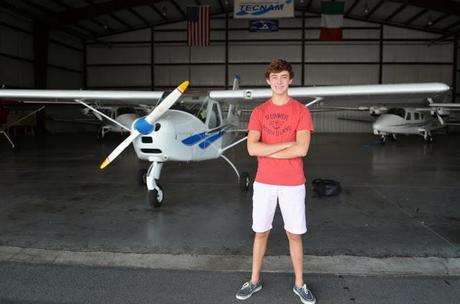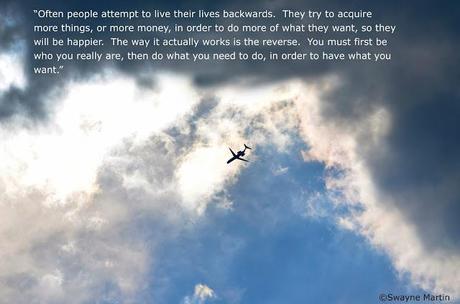
All of you know I'd like to be a Professional Pilot, hence the name of this site. If I had an ideal career path, it'd be something similar to the following: (*this is just a frame, I like to keep my options open, and let new opportunities arise)
- In my early 20's: Do some really interesting flying, such as flying in the Caribbean, Alaska, Africa, etc. I wouldn't plan on making much money, but would love to focus on having a laid-back lifestyle and gain some great flying and life experiences.
- Move into the airlines: Begin working towards a career as an airline pilot either nationally or abroad. Over time, I'd aspire to be flying internationally with a Major Airline.
- Go Corporate: After gaining airline time, search for a job with a corporate group to fly in a more relaxed, personable environment.
- Who knows?
Inspirational aviation video, "What do you desire? - A Pilot's Perspective:" (credits at the end of the video)
For a student pilot, the world can be viewed as a mountain, with becoming a professional pilot as a general goal. There are paths up to the top of the mountain; some quick, some fast, some expensive, some not. If I've learned one thing about college decisions, it's that everyone has an opinion on the best route to go.


In my case, I have the very generalized goal of becoming a professional pilot. I've had mentors explain different routes on how to "get there." To tie college into this makes the decision even more complicated. Below are a few of the many "paths" through college which I could take to start off my career as a pilot. Some pros and cons to each are listed below. (largely, information comes from current professional pilots that have served as mentors to me)
1.) The Aviation Universities: Many colleges in the USA have aviation and aerospace programs. Three examples of well known universities in the United States which either centralize on aviation, or have highly reputable aviation programs are: Embry Riddle (ERAU),Purdue, and the University of North Dakota(NDU).
- Pros:
- A like-minded student body, sharing the same passion
- A structured learning environment, students working together
- High acceptance rates
- Reduced hiring minimums (from 1,500 hours to 1,000 hours as of August, 2013)
- A degree in a field you're interested in
- Aviation-related minors (ATC, Aviation Management, etc)
- Alumni and Student Networking
- Airline quick-start programs, only available to students from these schools, see this link for examples: Internships and Development
- Instructing jobs (through the schools) offered to students and alumni
- Learn and fly on "top of the line" prop and jet simulators
- Take advantage of diverse, well maintained fleets of aircraft with glass cockpits
- (ERAU): two locations to choose from: Prescott, Arizona and Daytona Beach, Florida
- Cons:
- Expensive, expensive, oh yeah, and expensive
- Low paying career (early on) -- hard to pay off school debt
- Degree in Aeronautical Science isn't great for much else, besides being a pilot
- Too much aviation? It's something that you'll be constantly surrounded by... If you consider this as an option, you probably shouldn't be thinking about an aviation university anyways
- Group setting: everyone else is like you, a pilot, you're no longer unique
Example Aviation University (Embry Riddle):
2.) The Armed Forces (ROTC, Air Force, Navy, Marines, Air National Guard): For years, people relied upon military experience in order to become airline pilots. You get the chance to travel the world, get paid for it, serve your country, fly some incredible aircraft, build flights hours quickly, and have school paid for. As of late, more and more pilots are taking a civilian route to becoming professional pilots, contrary to popular belief.
- Pros:
- ROTC programs at many "normal" universities (including aviation universities)
- Have school paid for
- Military member benefits
- Paid to travel the world
- Opportunity to fly amazing aircraft (from F22's and C130's, to C5's)
- Build turbine time, quickly
- Serving your country
- Military networking
- Some airlines are known for being military "hubs" (Delta for instance)
- Cons:
- Joining the military is a serious commitment
- Your life could be at stake
- Military life can be extremely stressful and boring at times
- Extremely structured environment
- No guarantee of a pilot slot, there are a limited number of places
- Low salary
- Separation from family
- Unpredictable and un-controllable schedule
- Committing years of your life to the military, which gives up valuable seniority years in top-paying jobs later on (before the mandatory retirement age of 65)
Inspirational Military Flying:
3.) Go to a "Normal Univeristy:" Get a "normal degree" and do training at a flight school on the side. Your options are endless within this category. You can, in theory, money and academics permitting, go to any university in the country and do flight training on the side at an airport nearby.
- Pros:
- Free-form training, how you train is up to you
- Choose where and when you'll train
- Flight training is generally cheaper at a flight school vs. at a university
- Choose a college that you'd like to go to, that might not have a great aviation program
- Major in something other than aviation, as a backup, in case flying doesn't work out
- Have more relationships outside of aviation
- Not aviation all the time
- Cons:
- Majoring in something you might not care about
- Spending too much time away at the airport, training, thus not being able to maintain great relationships with friends that might not understand your passion
- Not as structured
- No quick start programs, not wasting valuable early years
- Networking comes from your own connections, no aviation alumni network
- Smaller fleet choice, less of a student to student support network
- Training in addition to college work is a lot to have on one plate
So what should you gain from all of this? -- There are so many paths you can take towards being a professional pilot, many more than I could even hope to list here. One is not necessarily "better" than another, it's just a matter of personal preference and finances. However I end up "getting there" will be written about in the future right here, on the blog.
This week, I'm headed down to Embry Riddle Aeronautical University (Daytona), and will be writing in detail about my experiences there. I'm hoping to bring you what visiting the campus would be like, and what I find out about ERAU, from my first ever college visit.
The inspirational quote of the day is posted below, this one is one of my favorites:
Thanks for reading and watching, stay tuned for many more posts soon!
-Swayne MartinTwitter: @MartinsAviation
Youtube: MartinsAviation1

So what do you think about this post, do you have any different opinions? Share what you think below. The more information you give, the better, for student pilots! Thanks again for visiting!
